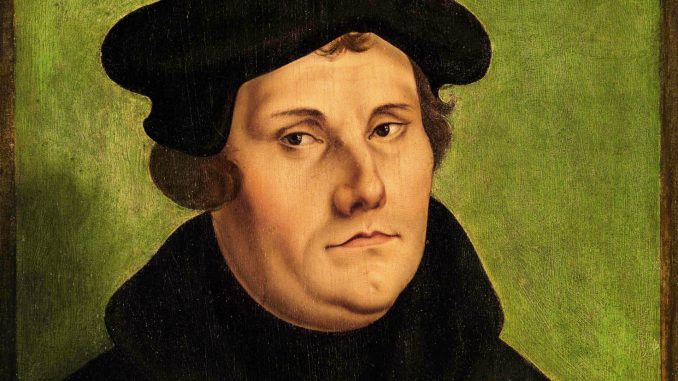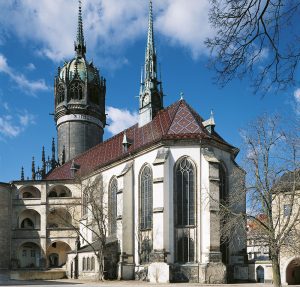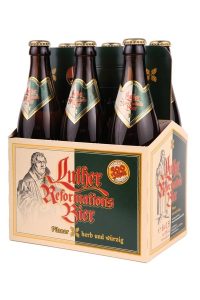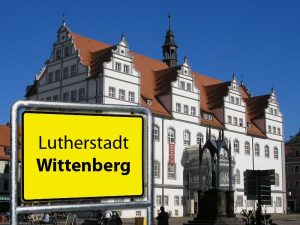
It’s Finally Here: The 500th Birthday of Protestantism
By Petra Schurmann
October 31, 2017, has certainly been a much-anticipated date in Germany and beyond, an important day for Protestants in many parts of the world. For the past 10 years, Germany has been paying tribute to one of its most celebrated sons and one of the most influential people in world history, Martin Luther, as this seminal anniversary approached.
 For it was five hundred years ago, on October 31, 1517, that the then-unknown Catholic monk, who was very critical of many practices of the Catholic authorities, made his disdain public by listing 95 topics, known today as the 95 theses, and displayed those on the door of the Castle Church in Wittenberg.
For it was five hundred years ago, on October 31, 1517, that the then-unknown Catholic monk, who was very critical of many practices of the Catholic authorities, made his disdain public by listing 95 topics, known today as the 95 theses, and displayed those on the door of the Castle Church in Wittenberg.
Martin Luther’s goal was to improve and reform church practices, especially their practice of selling indulgences to the people, promising them that this would lessen their sins. Little did he know that he would actually spark a wave of protest against the Catholic Church in Central Europe, which would eventually lead to the Reformation resulting in a revamp of the Catholic Church as well as the creation of the Protestant Church. Protestantism today counts 29.6 million members in Germany and 560 million members worldwide, making up more than a third of all Christians worldwide.
 The development and rise of Protestantism in Europe that followed Martin Luther’s call for reforms was a difficult and often violent process. Catholic persecution prompted many Protestant Christians to leave their European home country and emigrate to America, where they could practice their faith without fear.
The development and rise of Protestantism in Europe that followed Martin Luther’s call for reforms was a difficult and often violent process. Catholic persecution prompted many Protestant Christians to leave their European home country and emigrate to America, where they could practice their faith without fear.
I am currently in Germany experiencing the 500th Birthday of the Reformation firsthand. In celebration of the historic anniversary, October 31, 2017, was declared a national holiday in all of Germany, which certainly has brought Martin Luther to almost everyone’s mind. However, despite a decade-long series of events, exhibits, lectures and the publication of many new books and essays on Martin Luther, it still happens that people who were asked in the streets what special anniversary we were celebrating on October 31, 2017, would sometimes still answer, “I don’t know. Halloween?”
What does Martin Luther mean for you today?
For me, Martin Luther will always be a symbol of courage and resistance as well as an inspiration to protest against the dictate of unlawfully operating authorities, no matter how powerful they might be.
 Furthermore, I’d like to point out that Martin Luther did not only spark the beginning of what is known today as the Reformation, but thanks to translating the Bible from Latin into German, Luther furthered general literacy and made the teachings of the Bible available beyond the wealthy classes, to commoners as well. For the first time, people had direct access to the Bible and did not need to rely on the help or interpretation of a priest. Luther’s translation of the Bible coincided with the invention of the Gutenberg press, which created the possibility of printing documents in high volumes. Luther’s German version of the Bible was the first publication to be printed for the masses and it became the first “bestseller” in history. The first 3000 copies were sold in no time.
Furthermore, I’d like to point out that Martin Luther did not only spark the beginning of what is known today as the Reformation, but thanks to translating the Bible from Latin into German, Luther furthered general literacy and made the teachings of the Bible available beyond the wealthy classes, to commoners as well. For the first time, people had direct access to the Bible and did not need to rely on the help or interpretation of a priest. Luther’s translation of the Bible coincided with the invention of the Gutenberg press, which created the possibility of printing documents in high volumes. Luther’s German version of the Bible was the first publication to be printed for the masses and it became the first “bestseller” in history. The first 3000 copies were sold in no time.
Martin Luther also fought for education for everyone, disregarding social status or gender. In this regard, he should be remembered as one of the first advocates for women’s rights and for the right of every human being to have access to education.
For days leading up to the 500th anniversary, the German media has published countless interviews and reports trying to analyze the effect and final results that a decade of Luther-themed events in Germany has had. On the positive side, the special tourist programs offered by cities where Luther was born (Eisleben), lived (Mansfeld, Magdeburg, Eisenach), studied (Erfurt) and worked as a teacher and reformer (Wittenberg) were very well received. Plus, the number of visitors attending the many outstanding exhibits throughout the country exceeded expectations. On the other hand, the German Evangelical Church Convention in May in Berlin and Wittenberg, as well as “Kirchentag on the Way” in Leipzig, did not draw crowds of participants as expected.
Critics also lament that, in the craze of marketing hundreds of events for months, the Protestant faith itself has not been enough of a focal point. If the leaders of the Protestant Church had hoped for a surge in new church members and more people turning toward the Protestant (Evangelical) faith, they must certainly be disappointed.
“Message of the Small Steps” (Botschaft der kleinen Schritte) is the summary of the decade-long campaign published in the newspaper “Unsere Kirche” in Westphalia. The church has displayed an image of openness and liveliness, the article explains, however the work on the scripture itself needs to go further. Luther-year critic Dr. Benjamin Hasselhorn, scientific assistant at the Luther Memorial Foundation in Saxony-Anhalt and curator of a special exhibit in Wittenberg, would have preferred more theological discussion and more focus on what it means to be of Evangelical (Protestant) faith, as he mentioned in a TV talk show with Peter Hahne on ZDF recently.
In Hasselhorn’s opinion, the 500-year anniversary would have been a unique chance for the Protestant Church, which has been losing members in Germany continuously, to reconnect with the people and familiarize them again with the teachings of Luther and the Bible itself.
 However, on October 31, the actual anniversary, it was all about celebration. All over Germany, church communities organized concerts, open-air festivals and festive church services. People can enjoy “Lutherbier” and “Reformationsbrötchen” and attend the many Bach concerts and chiming in to sing the Luther choral “Ein feste Burg ist unser Gott.”
However, on October 31, the actual anniversary, it was all about celebration. All over Germany, church communities organized concerts, open-air festivals and festive church services. People can enjoy “Lutherbier” and “Reformationsbrötchen” and attend the many Bach concerts and chiming in to sing the Luther choral “Ein feste Burg ist unser Gott.”
T he town of Wittenberg itself is understandably especially excited. A Reformation Festival saw jugglers, musicians, hosts, craftsmen and people from the Middle Ages” gather in the town center, before the church opened for a festive church service at 3 p.m. (German time) and a commemorative concert in the evening. Germany’s President Frank-Walter Steinmeier, former president Joachim Gauck and Chancellor Angela Merkel were in attendance.
he town of Wittenberg itself is understandably especially excited. A Reformation Festival saw jugglers, musicians, hosts, craftsmen and people from the Middle Ages” gather in the town center, before the church opened for a festive church service at 3 p.m. (German time) and a commemorative concert in the evening. Germany’s President Frank-Walter Steinmeier, former president Joachim Gauck and Chancellor Angela Merkel were in attendance.
And if you have had no time or interest to check out some of the special events celebrating this year’s anniversary so far, there are still lots of opportunities to catch up on Martin Luther’s legacy, since many events continue until the end of the year or even until Spring 2018.
Click here for more information on upcoming events
Thanks for your good article. If not for Martin Luther I along with millions of others would probably be Catholic. Something to think about in terms of other oppressors.